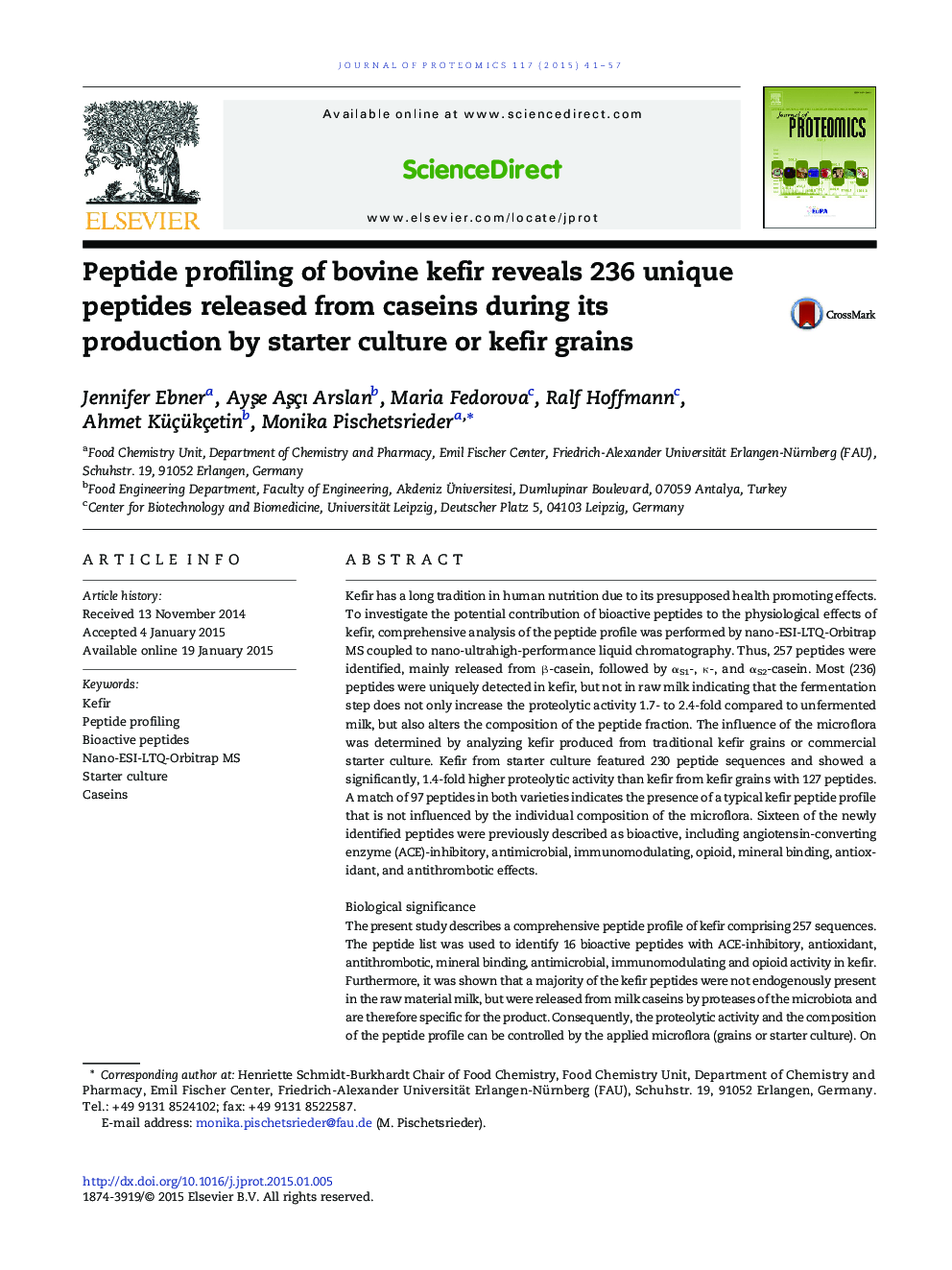| کد مقاله | کد نشریه | سال انتشار | مقاله انگلیسی | نسخه تمام متن |
|---|---|---|---|---|
| 1225702 | 1494763 | 2015 | 17 صفحه PDF | دانلود رایگان |
• Comprehensive profiling identified 257 peptides in kefir.
• Among those, 236 were unique to the product.
• 16 bioactive, e.g. ACE-inhibitory or antimicrobial peptides were revealed.
• Most peptides were released from caseins during fermentation by the microflora.
• Composition and quantity of peptides can be controlled by the chosen starter culture.
Kefir has a long tradition in human nutrition due to its presupposed health promoting effects. To investigate the potential contribution of bioactive peptides to the physiological effects of kefir, comprehensive analysis of the peptide profile was performed by nano-ESI-LTQ-Orbitrap MS coupled to nano-ultrahigh-performance liquid chromatography. Thus, 257 peptides were identified, mainly released from β-casein, followed by αS1-, κ-, and αS2-casein. Most (236) peptides were uniquely detected in kefir, but not in raw milk indicating that the fermentation step does not only increase the proteolytic activity 1.7- to 2.4-fold compared to unfermented milk, but also alters the composition of the peptide fraction. The influence of the microflora was determined by analyzing kefir produced from traditional kefir grains or commercial starter culture. Kefir from starter culture featured 230 peptide sequences and showed a significantly, 1.4-fold higher proteolytic activity than kefir from kefir grains with 127 peptides. A match of 97 peptides in both varieties indicates the presence of a typical kefir peptide profile that is not influenced by the individual composition of the microflora. Sixteen of the newly identified peptides were previously described as bioactive, including angiotensin-converting enzyme (ACE)-inhibitory, antimicrobial, immunomodulating, opioid, mineral binding, antioxidant, and antithrombotic effects.Biological significanceThe present study describes a comprehensive peptide profile of kefir comprising 257 sequences. The peptide list was used to identify 16 bioactive peptides with ACE-inhibitory, antioxidant, antithrombotic, mineral binding, antimicrobial, immunomodulating and opioid activity in kefir. Furthermore, it was shown that a majority of the kefir peptides were not endogenously present in the raw material milk, but were released from milk caseins by proteases of the microbiota and are therefore specific for the product. Consequently, the proteolytic activity and the composition of the peptide profile can be controlled by the applied microflora (grains or starter culture). On the other hand, a considerable portion of the peptide profile was identified to be typical for kefir in general and independent from production parameters.In summary, the generated kefir peptide profile helped to reveal its origin and to identify bioactive peptides in kefir, which may advance the understanding of health benefits of this food product. The results further indicate that subsets of the kefir peptide list can be used as markers to control food authenticity, for example, to distinguish different types of kefir.
Figure optionsDownload high-quality image (174 K)Download as PowerPoint slide
Journal: Journal of Proteomics - Volume 117, 18 March 2015, Pages 41–57
